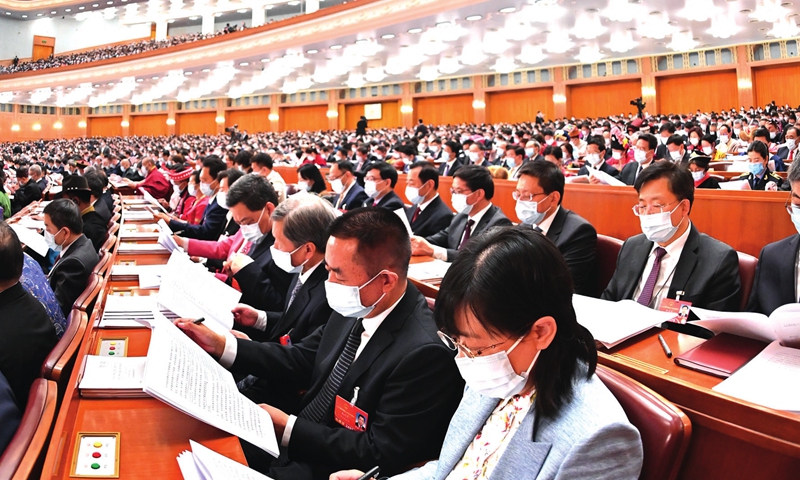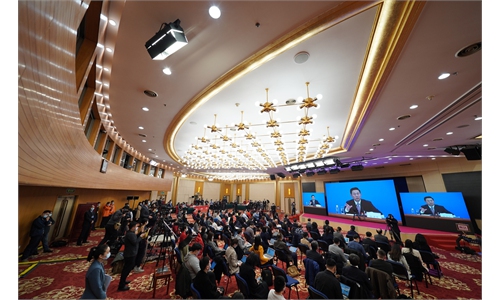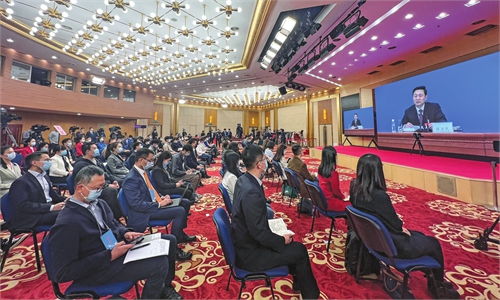
The fifth session of the 13th National People's Congress opens at the Great Hall of the People in Beijing on March 5, 2022. Photo: VCG
The "two sessions" held every spring are not only major political events in China, but also important parts of the whole-process people's democracy, which includes three stages: collecting ideas, formulating policies and laws, and implementation.The stage of collecting ideas means soliciting opinions from multiple parties many times, aiming at forming a consensus. After the consensus is formed, there comes the second stage - the two sessions. The main function of the two sessions is to turn societal consensus into enforceable laws and policies.
We can see the difference between China's whole-process democracy and Western democracy. In China, the formation of consensus and policies has two different stages, but it is not the case in the West. It is rare to see fierce debate during the two sessions, and motions are often passed by overwhelming votes because the debate was over long before the two sessions. In the West, heated debates are held in Congress to reach consensuses. If there is no consensus, then the bills may be forced to pass by voting. This process is influenced by party interests and interest groups. Thus, antagonism is increasing in Western politics and it will be more difficult for the so-called consensus to represent common people.
Due to political polarization in the West, the process of passing Congressional policies is very long. Meanwhile, there is no other way to form a consensus and thus Western leaders may bypass the legislature and issue various policies with executive orders. In this way, they have abandoned the important democratic process of building consensus. Those in power do not consider or accept any different opinions. Technically, this cannot be called democracy. The West's so-called democracy is nothing but a vote every four years and then becomes an empty shell.
The formation of consensus in China is also a process with fierce collision of various views and interests, and it takes a long time for many policies to be carried out. If the consensus cannot be reached, discussions and consultations will continue, instead of forcibly passing a policy through voting as in the West. In China, the implementation of many major laws often takes decades. For example, China's first bankruptcy law was the Enterprise Bankruptcy Law (For Trial Implementation), promulgated in December 1986. According to the plan at that time, the law was supposed to be replaced by a formal law after the trial. But back then, China was transitioning from a planned economy to a socialist market economy, and there were many disputes over how enterprises should go bankrupt and what social responsibilities they should assume. It was not until 20 years later, in August 2006, that the National People's Congress passed the Enterprise Bankruptcy Law.
This is not the only example. The Property Law began to be drafted in 1993. It was not until December 2002 that it was first reviewed by the Standing Committee of the 9th National People's Congress, and the full text of the draft was released to the public in July 2005 and again solicited for opinions, and then reviewed six times. On March 16, 2007, the draft was passed with 2,799 votes in favor, 52 votes against and 37 abstentions at the Fifth Session of the 10th National People's Congress. The whole process took 14 years. The West has seen the high approval of 2,799 votes but has failed to see the 14-year process of seeking consensus.
The advantage of China's whole-process people's democracy is that the process and results do not represent any party or interest group, but all citizens. So it can resolve differences and bridge divisions through the democratic process, and make the whole society more united. This is completely different from Western democracy where the results represent only one political party and certain interest groups. Such a process often leads to confrontation and division of society. This phenomenon is seen not only in the congressional process but also in general elections. In the 2016 and 2020 US presidential elections, the phenomenon of non-recognition of election results intensified and eventually led to the Capitol Hill riot.
The West used to regard its own model as the standard and believed China's two sessions were "rubber-stamp assemblies." On the one hand, this is arrogant prejudice, and on the other hand, the West lacks an understanding of China's democratic model. Now, there is a more important reason: The Chinese democratic model has demonstrated its strong effectiveness after decades of practice and testing. This is in stark contrast to the growing institutional failure and incapacity in the West.
Since the beginning of the 21st century, the West has failed to handle challenges including counter-terrorism, economic crises, populism and the COVID-19 pandemic. Under such circumstances, the Western hard power can no longer effectively defend the effectiveness of its system, and it can only rely on its discourse and soft power to deny China. This is already a matter of geopolitics and national interests, instead of an objective discussion of which kind of democracy is better. When the West is so complacent and refuses to face its own problems or learn from China's experience, how can it innovate? How is it possible to solve its problem?
Fundamentally, China's institutional advantages and governance effectiveness are because China not only inherits its own traditions but also draws on the achievements of world political civilizations. Such a system has strong organization and mobilization ability, great ability to resolve problems, and makes China quickly learn and correct mistakes. It also provides keen flexibility and the capability to cultivate and select outstanding talents. Its advantages are a rapid response to public opinion and efficient accountability of officials. When the government makes decisions, it focuses on people's interests.
Every year, the two sessions are a demonstration of China's institutional advantages worldwide. The two sessions held in the spring of 2022 are no exception.
The author is a research fellow at the China Institute, Fudan University. opinion@globaltimes.com.cn


